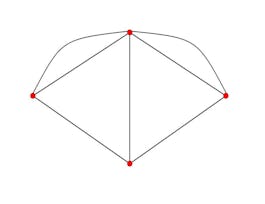This course is designed to quite literally ‘make a science’ out of something at the heart of society: social networks. Humans are natural network scientists, as we compute new network configurations all the time, almost unaware, when thinking about friends and family (which are particular forms of social networks), about colleagues and organizational relations (other, overlapping network structures), and about how to navigate delicate or opportunistic network configurations to save guard or advance in our social standing (with society being one big social network itself). While such network structures always existed, computational social science has helped to reveal and to study them more systematically. In the first part of the course we focus on network structure. This looks as static snapshots of networks, which can be intricate and reveal important aspects of social systems. In our hands-on lab, you will also visualize and analyze a network with a software yourself, which will help to appreciate the complexity social networks can take on. During the second part of the course, we will look at how networks evolve in time. We ask how we can predict what kind of network will form and if and how we could influence network dynamics.


Social Network Analysis
This course is part of Computational Social Science Specialization
Taught in English
Some content may not be translated

Instructor: Martin Hilbert
15,094 already enrolled
Included with 
Course
(224 reviews)
What you'll learn
Define networks and discover the languages networks use.
Analyze a social network through data wrangling and visualizing a network.
Discuss what mechanisms generate networks.
Examine social networks analysis using case studies.
Details to know

Add to your LinkedIn profile
5 quizzes
Course
(224 reviews)
See how employees at top companies are mastering in-demand skills

Build your subject-matter expertise
- Learn new concepts from industry experts
- Gain a foundational understanding of a subject or tool
- Develop job-relevant skills with hands-on projects
- Earn a shareable career certificate


Earn a career certificate
Add this credential to your LinkedIn profile, resume, or CV
Share it on social media and in your performance review

There are 5 modules in this course
In this module, you will be introduced to the concept of networks. You will be able to define networks and identify how data is transformed and analyzed in a network. You will able be able to discuss how to formalize networks.
What's included
8 videos2 readings1 quiz1 discussion prompt
In this module, you will be able to discuss the structure of networks and be able to explain how a person can be the center of one. You will be able to discover the different types of language that networks use and be able to identify the three types of network measurements.
What's included
12 videos1 reading1 quiz
In this module, you will begin with a social network analysis lab activity. You will be able to do data wrangling of databases and visualize a network. You will be able to analyze a social network and also be able to examine other social network analysis through case studies.
What's included
9 videos4 readings1 quiz1 peer review
In this module, you will be able to identify the different types of social networks. You will be able to discuss what mechanisms generates these different types of networks and you will be able to explain how networks move from being static to dynamic.
What's included
8 videos1 quiz
In this module, you will be able to examine theoretical predictions of networks. You will be able to calculate basic math problems and be able to discuss how to make networks more efficient and stable.
What's included
9 videos1 quiz1 discussion prompt
Instructor

Offered by
Recommended if you're interested in Data Analysis

University of California, Davis

University of California, Davis

University of California, Davis

Stanford University
Why people choose Coursera for their career




Learner reviews
Showing 3 of 224
224 reviews
- 5 stars
80.35%
- 4 stars
13.39%
- 3 stars
2.67%
- 2 stars
1.78%
- 1 star
1.78%
New to Data Analysis? Start here.

Open new doors with Coursera Plus
Unlimited access to 7,000+ world-class courses, hands-on projects, and job-ready certificate programs - all included in your subscription
Advance your career with an online degree
Earn a degree from world-class universities - 100% online
Join over 3,400 global companies that choose Coursera for Business
Upskill your employees to excel in the digital economy
Frequently asked questions
These are some reflections shared by students who have worked through the content of the Specialization on Computational Social Science:
"Highly enjoyable and most importantly, giving me exceptionally important skills to fulfill my job requirements at a new position in Munich. You may be interested to know the impact of your course on salary and in my case, the knowledge and certification gained adds about another Euro 20.000 on the annual salary (taking it to about Euro 120.000 p.a.)."
"My overall impression of this was: I can't wait to use this for other stuff!!"
"I absolutely think that these tools could be used in my future jobs, or even as a personal reflection. If you scrape and analyze the comments/reactions that your business gets on Youtube, Twitter, Instagram, etc., what does their language use say about how they interact with your brand — or what your brand brings out in them?"
"Wow, this is cool and fun stuff. Even though I may not pursue anything social-science related in the near future, it is still nice to learn and get to experience all of these tools that computational social science offers and benefits in all kinds of careers and fields of study."
"I particularly enjoyed the web-scraping for some reason. It feels very advanced although its very easy. ...It seems to be a very fast and efficient way of grabbing data."
"I enjoyed playing around with machine learning! ...It was also amazing to me how quickly it was able to grasp and learn our input in seconds. It makes me wonder how much more technology will advance in these next few years... It's scary but fascinating."
"The fact that these tools are so easily usable and attainable is incredible in my mind. Not only do we have access to them like we have access to things like Facebook and Twitter, but they're FREE."
"The most interesting aspect was the fact that these tools are all free and online. In the past, only researchers at well-funded universities had access to programs like the ones we used in all of our labs. But now, even someone without much technical knowledge on complex software can use these tools."
"I am so surprised that these tools are available to anyone through a simple download, and even more so that they are very user friendly and easy to learn how to navigate. I plan on starting a clothing line company in the future and I think it will be really helpful for me to be able to analyze so much online data."
"As an Environmental Policy Analysis and Planning major, I was fascinated to learn that there is a feasible way to simulate policy implementation and impact multiple times within a short span of time."
"UCCSS has allowed me to feel more confident in my abilities with a computer and to better understand companies like Facebook or Twitter. ...these tools really are powerful but also dangerous. ...It allows powerful individuals to manipulate ideas."
"Throughout the course, the content was challenging, but when it was finally applied to the labs at the end of each module, it was really rewarding to see everything play out. It was even more rewarding when it made sense too! ... I'm really glad I took this course! It was definitely a challenge, but I'm glad I got to experience and learn about so many topics I never knew even existed."
"It was fun seeing the results of the code that I made, and I never thought that I would be doing something like this in my life. The results also showed me what the society would look like.... Social network analysis and web scraping could be the tools that I use in my future job as all the internship that I'm looking now all related to social media or digital media."
"My career aspiration is to be a digital marketing expert. These computational tools have enormous implications for the field."
"I really really loved that this class let me learn hands-on and gave me experience with tools that have real world application and combine STEM & social science. I think that a lot of these tools are useful far beyond homework activities."
"Best course I have taken. I wish more online courses structured like this would be offered."
This Specialization on Computational Social Science is the result of a collective effort with contributions from Professors from all 10 campuses of the University of California. It is coordinated by Martin Hilbert, from UC Davis, and counts with lectures from:
1) UC Berkeley: Joshua Blumenstock, Prof. iSchool; Stuart Russell, Professor of Computer Science and Engineering.
2) UC Davis: Martin Hilbert, Prof., Dpt. of Communication & Seth Frey, Prof., Dpt. of Communication & Cynthia Gates, Director of the IRB.
3) UC Irvine: Lisa Pearl, Prof. Cognitive Sciences.
4) UC Los Angeles: PJ Lamberson, Assistant Prof. Communication Studies.
5) UC Merced: Paul Smaldino, Prof. Cognitive and Information Sciences.
6) UC Riverside: Christian Shelton, Prof. Computer Science.
7) UC San Diego: James Fowler, Prof. Global Public Health and Political Science.
8) UC San Francisco: Maria Glymour, Associate Prof. School of Medicine, Social Epidemiology & Biostatistics.
9) UC Santa Barbara: René Weber, Prof. Dpt. of Communication & Media Neuroscience Lab (with Frederic Hopp).
10) UC Santa Cruz: Marilyn Walker, Prof. Computer Science, Director, Computational Media.
Access to lectures and assignments depends on your type of enrollment. If you take a course in audit mode, you will be able to see most course materials for free. To access graded assignments and to earn a Certificate, you will need to purchase the Certificate experience, during or after your audit. If you don't see the audit option:
The course may not offer an audit option. You can try a Free Trial instead, or apply for Financial Aid.
The course may offer 'Full Course, No Certificate' instead. This option lets you see all course materials, submit required assessments, and get a final grade. This also means that you will not be able to purchase a Certificate experience.

